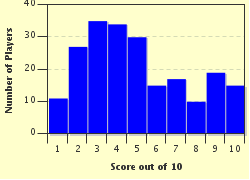Quiz Answer Key and Fun Facts
1. Which of the following heroes was NOT on the Achaean (Greek) side during the Trojan War?
2. Which of the following was NOT one of the nine Muses?
3. Which of the following heroes has a different divine father from the others?
4. Which of the following was NOT a battle fought during the Persian Wars?
5. Which of the following was NOT an ancient Greek tragic poet?
6. Which of the following is NOT a work by Plato?
7. Which of the following was NOT one of the four Panhellenic games of ancient Greece?
8. Which of the following was not a battle fought during the Peloponnesian War between Athens and Sparta (413-404)?
9. Which of the following was NOT one of Alexander's Companions?
10. Which of the following was NOT a Greek writer during the period of the Roman Empire?
Source: Author
Ampelos
This quiz was reviewed by FunTrivia editor
bloomsby before going online.
Any errors found in FunTrivia content are routinely corrected through our feedback system.


